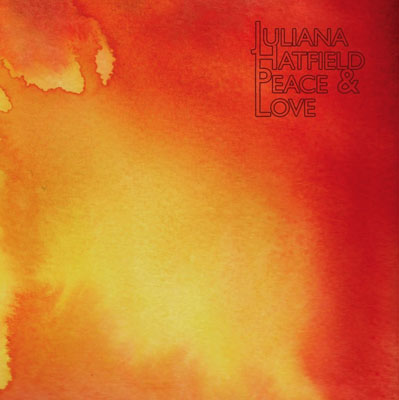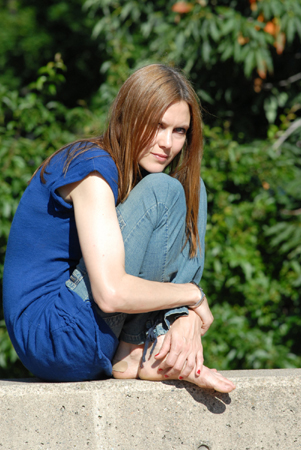 Let’s get one thing out of the way right from the start — Peace & Love, Juliana Hatfield’s tenth full-length solo album (not including live, compilation or archival releases – but who’s counting?), is the quietest and lowest-fi record she has ever made. If it were 1993 again (or even 2008, for that matter), a set of twelve acoustic Juliana Hatfield recordings such as these would be considered little more than a collection of demos.
Let’s get one thing out of the way right from the start — Peace & Love, Juliana Hatfield’s tenth full-length solo album (not including live, compilation or archival releases – but who’s counting?), is the quietest and lowest-fi record she has ever made. If it were 1993 again (or even 2008, for that matter), a set of twelve acoustic Juliana Hatfield recordings such as these would be considered little more than a collection of demos.
Literally, Peace & Love is about 90% acoustic from top to bottom — acoustic guitar anchors every song, and in some cases, it’s the only instrument present. Electric guitar shows up as window dressing once in a while, but it’s never more than that. Even the occasional keyboard and drum machine cannot take away from the overriding voice of the acoustic guitar throughout Peace & Love.
Now that we know what we’re dealing with here, let’s get to the other main point I’ve determined — or feel, to be more up front about it — is the main crux of Peace & Love: as a collection of songs, it’s been a long time since Hatfield put out a record so warm and affecting, so hopeful in its examination of loneliness and pain, and just plain comforting.
Perhaps not having to deal with the technical aspects of assembling a fully produced record freed her up to really get into these songs, and to express herself through their characters in such a way that the listener — or I, at the very least — wants to keep returning to them, taking the words in, marveling at Hatfield’s resonant chord choices, and enjoying the simple pleasure of hearing her seasoned yet still resolutely youthful voice doubled up like a warm aural blanket, the kind you want to curl up with at night when it’s time to go to sleep but you’re not quite ready yet.
 Comfort isn’t a feeling often found on Juliana’s albums, at least not so consistently and directly. But right from the start, the title track sets the tone immediately and encapsulates the mood and attitude behind the whole album — ”don’t give up on peace and love.” There’s no sarcasm, no irony, no bitterness — just a sincere plea in the face of deteriorating relationships, unhappy and disconnected friends and enemies, and the kindness of anonymous strangers. And joy of joys, the half sad, half hopeful melody of the chorus is as infinitely addictive as any of Juliana’s best songs. Nay, it is one of her best songs.
Comfort isn’t a feeling often found on Juliana’s albums, at least not so consistently and directly. But right from the start, the title track sets the tone immediately and encapsulates the mood and attitude behind the whole album — ”don’t give up on peace and love.” There’s no sarcasm, no irony, no bitterness — just a sincere plea in the face of deteriorating relationships, unhappy and disconnected friends and enemies, and the kindness of anonymous strangers. And joy of joys, the half sad, half hopeful melody of the chorus is as infinitely addictive as any of Juliana’s best songs. Nay, it is one of her best songs.
The comfort theme threads itself further in songs that dig deeper, like the second person account ”What Is Wrong” (”why can’t this be as easy as it is to breathe?” she asks a hopeless friend, presumably, whose anxiety is driving a rejection of basic life activities like sleeping and eating), the straightforward girl bonding anthem ”Faith In Our Friends,” and most sublimely in the dreamy tune ”Butterflies,” a beautiful paean to the healing powers of, well, butterflies. Or rather, remembering to find solace in those bits of nature that are easily overlooked when we’re so bogged down with endless worries that getting through the night alone, towards the reward of sleep, seems utterly hopeless. Truly though, a tune this lovely could amplify my appreciation for a Phillips-head screwdriver if that’s what she had chosen to write about. It’s a master stroke of beauty regardless of the subject matter, with her acoustic guitar and piano gently dancing together beneath the harmony of the chorus.
Juliana doesn’t completely abandon the angst that has always driven her work, though — after all, that’s where this whole outpouring comes from to begin with. ”Why can’t we be like we never could be?” she asks in ”Evan,” which has been revealed to be about — you guessed it — Evan Dando. She’s professing her love for someone she tried to write off, but can’t, and it rings with a resigned sadness that begs for the comfort Juliana herself was doling out earlier in the album. And ”I’m Disappearing” revisits the masochistic and near-suicidal territory she has explored in the past, albeit with a small expression of fighting it off that, in the context of the rest of the record, casts the song as just one of those ”little bumps in the road” she refers to in ”Let’s Go Home.”
By the end of the record, Juliana is reaching out to and empathizing with an anonymous stalker, feeling his fear and shame, and leaving us all with a reminder that, in many ways, we’re all the same. Put forth in her own way, it only makes Peace & Love that much more endearing.
After living with the album pretty closely, playing it repeatedly for days on end, I’m sure this is the best, most mature album of Juliana Hatfield’s career to date. Thank goodness she didn’t follow through on her thought to quit music two years ago — she did have that masterpiece inside of her to keep working towards, and here it is. With so many of our individual and collective hopes remaining unrealized and antagonized more than a year after we were filled with so much optimism, this album couldn’t have come at a better time.
[kml_flashembed movie="http://www.youtube.com/v/i8cbXELSvpY" width="600" height="344" allowfullscreen="true" fvars="fs=1" /]




Comments